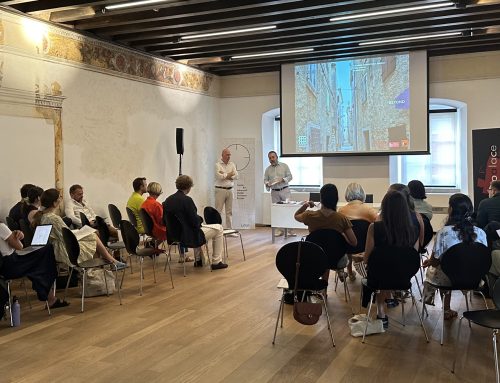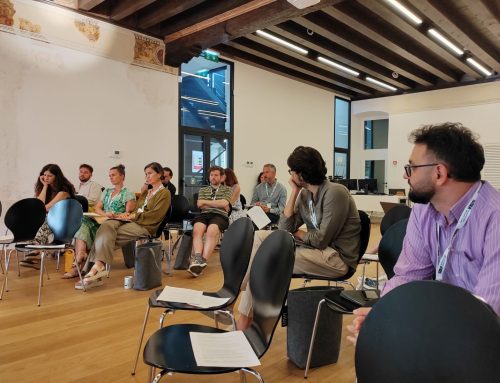Rijeka, Croatia, 10-12 July 2019
Call for Papers
Since the end of the First World War, cities and regions in Europe, particularly in the eastern half of the continent, witnessed frequent changes in borders. Previous research on border change and territorial transfers has focused on the actions of nationalizing regimes after the 1919 Paris conference, as well as the post-1945 transfer of territories in East-Central Europe and ensuing flight, expulsions and repopulation programs (Rieber 2000, Ther and Siljak 2001, Ballinger 2003, Crainz Pupo and Salvatici 2008, Snyder 2010, Ferrara 2011, Thum 2011, Reinisch, and White 2011, Ferrara and Pianciola 2012, Service 2013, Sezneva 2013). Recent research has analysed how states appropriated cities and regions they gained from neighbours (Karch 2018), and, in the case of socialist states, used urban remodelling as an opportunity to showcase socialist modernization projects , as occurred in Lviv, Ukraine (Amar 2015) and in Yugoslavia (Kulić and Mrduljaš 2012, Le Normand 2014). While research on transferred cities and territories has tended to see border changes primarily as ruptures tearing people from their old lives and cutting cities off from their previous national frameworks, this emphasis is called into question by scholarship by geographers and sociologists who comprehend cities not as discrete entities but as nodes within regional, national and global networks. From this perspective, cities are spaces in which flows of different types (goods, labour, capital, information) enter, converge, and exit, connecting these cities with other circuits and points across the globe (Massey 1991, Castells 2002, Harvey 2003).
This conference seeks contributions that showcase research on history, memory, and mapping tools in the context of European border changes in the twentieth century. We are interested in highlighting research on the experience of cities and regions that have undergone border changes in the twentieth century in order to showcase histories of transition, to examine the reshaping of local and regional memory practices, and to explore the variety of research methods that might be used to conceptualize and visualize change.
We welcome contributions which investigate:
- consequences of border changes on self-identification and the everyday experience of the individual
- consequences of border change for the reconfiguration of the urban built environment
- changes in perceptions of identity and memory in the city; identity politics and memory politics; shifting memory
- the potential of mapping and graphic representation to bring forward knowledge about geospatial transformations, ruptures and continuities of the past in cities and
While the focus is on historical processes and the reshaping of memory practices, we invite scholars from a variety of disciplines who can contribute different perspectives and methodologies, including researchers who employ digital methods. The conference will include a special panel on how digital mapping can challenge our understanding of sociopolitical processes. The conference aims to be a platform for exchange among researchers on various contexts using an array of methods, in order to push forward and expand our understanding of history and memory in border areas.
Confirmed keynote speakers:
Anne Kelly Knowles, McBride Professor of History at the University of Maine, editor of Placing History: How Maps, Spatial Data, and GIS Are Changing Historical Scholarship (2008) and Geographies of the Holocaust (2014), Guggenheim fellow (2015).
Brendan Karch, Assistant Professor of History at Louisiana State University, author of Nation and Loyalty in a German-Polish Borderland: Upper Silesia, 1848–1960 (Cambridge University Press, 2018)
Olga Sezneva, Assistant Professor of Sociology at the University of Amsterdam, whose work has examined the connection between the urban built environment and social memory (particularly in the case of Kaliningrad/Königsberg), human mobility, and digital technologies; part of the artistic collective Moving Matters Traveling Workshop.
Please send abstracts of no longer than 300 words and a short bio (no more than 100 words) by
February 15th 2019 to Gruia Badescu at gruia.badescu@uni-konstanz.de
Travel stipends and free accommodation may be available for a limited number of participants, pending funding application decisions – please mention in your application if you would like to be considered for funding.
The conference is organized by the Centre for Advanced Studies South East Europe at the University of Rijeka, with the support of the Social Sciences and Humanities Research Council of Canada-funded project “Rijeka in Flux: Borders and Urban Change after World War II” (https://rijekafiume.geolive.ca/), the Memoryscapes project’s “Seasons of Power” flagship programme for Rijeka 2020 – European Capital of Culture, and the Max Planck Institute for the Study of Religious and Ethnic Diversity Research Group, “Empires of Memory: The Cultural Politics of Historicity in Former Habsburg and Ottoman Cities”.
Cities and Regions in Flux after Border Change: Reconfiguring the frontier, reshaping memory and visualizing change in twentieth century Europe
Home- Cities and Regions in Flux after Border Change: Reconfiguring the frontier, reshaping memory and visualizing change in twentieth century Europe

Heading 1
Lorem ipsum dolor sit amet, consectetur adipiscing elit, sed do eiusmod tempor incididunt ut labore et dolore magna aliqua. Ut enim ad minim veniam, quis nostrud exercitation ullamco laboris nisi ut aliquip ex ea commodo consequat. Duis aute irure dolor in reprehenderit in voluptate velit esse cillum dolore eu fugiat nulla pariatur.
Naslov lorem ipsum test
Lorem ipsum dolor sit amet, consectetur adipiscing elit, sed do eiusmod tempor incididunt ut labore et dolore magna aliqua. Ut enim ad minim veniam, quis nostrud exercitation ullamco laboris nisi ut aliquip ex ea commodo consequat. Duis aute irure dolor in reprehenderit in voluptate velit esse cillum dolore eu fugiat nulla pariatur.
Heading 1
Obican tekst dolor sit amet, consectetur adipiscing elit, sed do eiusmod tempor incididunt ut labore et dolore magna aliqua. Tristique et egestas quis ipsum suspendisse ultrices. Eu consequat ac felis donec et odio pellentesque. Aliquam eleifend mi in nulla posuere sollicitudin aliquam ultrices sagittis. A pellentesque sit amet porttitor eget. Mauris a diam maecenas sed enim ut sem. Quisque id diam vel quam elementum. Quam viverra orci sagittis eu volutpat odio facilisis mauris sit. Neque ornare aenean euismod elementum nisi. Convallis tellus id interdum velit. Eu volutpat odio facilisis mauris. Nibh venenatis cras sed felis eget velit aliquet. Cursus vitae congue mauris rhoncus aenean. Volutpat consequat mauris nunc congue nisi vitae suscipit. Sollicitudin ac orci phasellus egestas tellus rutrum tellus pellentesque. Nisl tincidunt eget nullam non. Nunc scelerisque viverra mauris in aliquam sem.
Stil naglašavanja v1 sit amet, consectetur adipiscing elit, sed do eiusmod tempor incididunt ut labore et dolore magna aliqua. Tristique et egestas quis ipsum suspendisse ultrices. Eu consequat ac felis donec et odio pellentesque. Aliquam eleifend mi in nulla posuere sollicitudin aliquam ultrices sagittis. A pellentesque sit amet porttitor eget. Mauris a diam maecenas sed enim ut sem.
Stil naglašavanja v2 sit amet, consectetur adipiscing elit, sed do eiusmod tempor incididunt ut labore et dolore magna aliqua. Tristique et egestas quis ipsum suspendisse ultrices. Eu consequat ac felis donec et odio pellentesque. Aliquam eleifend mi in nulla posuere sollicitudin aliquam ultrices sagittis. A pellentesque sit amet porttitor eget. Mauris a diam maecenas sed enim ut sem.


Heading 2
Obican tekst dolor sit amet, consectetur adipiscing elit, sed do eiusmod tempor incididunt ut labore et dolore magna aliqua. Tristique et egestas quis ipsum suspendisse ultrices. Eu consequat ac felis donec et odio pellentesque. Aliquam eleifend mi in nulla posuere sollicitudin aliquam ultrices sagittis. A pellentesque sit amet porttitor eget. Mauris a diam maecenas sed enim ut sem. Quisque id diam vel quam elementum. Quam viverra orci sagittis eu volutpat odio facilisis mauris sit. Neque ornare aenean euismod elementum nisi. Convallis tellus id interdum velit. Eu volutpat odio facilisis mauris. Nibh venenatis cras sed felis eget velit aliquet. Cursus vitae congue mauris rhoncus aenean. Volutpat consequat mauris nunc congue nisi vitae suscipit. Sollicitudin ac orci phasellus egestas tellus rutrum tellus pellentesque. Nisl tincidunt eget nullam non. Nunc scelerisque viverra mauris in aliquam sem.

Stil Nabrajanja sed do eiusmod tempor incididunt ut labore et dolore magna aliqua. Tristique et egestas quis ipsum
suspendisse ultrices. Eu consequat ac
- Felis donec et odio pellentesque.
- Aliquam eleifend mi in nulla posuere sollicitudin aliquam ultrices sagittis.
- A pellentesque sit amet porttitor eget. Mauris a
https://youtu.be/3L6GIsXqeMA
News
CAS SEE latest posts
04 July 2021 CAS SEE Seminars with Guests: Lura Limani On Thursday, July 8th at 10 am (CET), we hosted CAS SEE Weekly Seminar with Lura Limani, presented by… Read More
05 July 2021 CAS SEE Seminars with Guests: Luigi Ceccarini On Wednesday, July 14th at 10 am (CET), we hosted CAS SEE Weekly Seminar with Professor Luigi Ceccarini,… Read More
19 July 2021 Job Vacancy MOISE Palace Program and Fundraising Director
Job Vacancy
Organization: MOISE Palace – Regional Center… Read More





